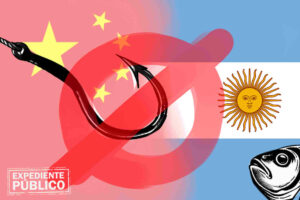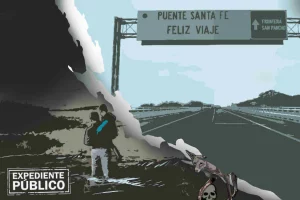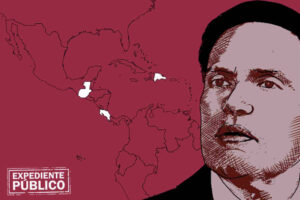Topic of this special report: Penal justice system in Honduras
The history of Honduras’ Public Ministry (Prosecutor General’s Office), an institution created by law in 1993 and made operational the following year, has been marked by the National Congress’ questionable political decisions and by the dearth of indictments against drug lords and important personalities fingered as corrupt.
In March 1994 the National Congress appointed Edmundo Orellana Mercado as the first prosecutor general for a five-year term. In just a few months, Orellano had set up nine special prosecutor’s offices, the Criminal Investigation Division (DIC) and a modern Forensic Medicine Division with a team that continues functioning at least in part today.
The DIC’s predecessor was the National Investigations Division (DNI), under the control of the Armed Forces, which had been accused of multiple offenses and human rights violations. By 1993 society had seen the need to create a new entity that would take charge of criminal investigation and of guiding indictments through the courts. That was the context in which the Public Ministry and its DIC came into being.
Former Honduran attorney officer Omar Menjívar views what Edmundo Orellana accomplished during his administration as noteworthy. He filed accusations of corruption in the courts against a sitting President (Carlos Roberto Reina), a former President (Rafael Leonardo Callejas), a sitting foreign minister (Ernesto Paz Aguilar) and several mayors, other functionaries and military officers who were also human rights violators. These acts were “something that had never before been seen in Honduras.”
Menjívar recalls that “at that point, the politicians realized [the Public Ministry] was a threat, a danger they had created, and they began to plot the way to undermine it.”
The blows to weaken it came from the National Congress, which according to former Prosecuting Attorney General Orellana is “the greatest source of corruption in Honduras.” It was this entity that in 1998 interceded to dominate the Public Ministry, even separating the DIC and putting it under the National Police.
This is one of the factors that left Honduras “exposed to organized crime, with no possibilities of professional investigation” for 20 years, Orellana explained without mincing words.
The National Police that assumed crime prevention and investigation is the same one that currently has seven of its officers extradited or turned over to US authorities for activities linked to drug trafficking and whose top officials have been accused of planning and participating in contract killings, such as the murder of anti-drug czar Julián Arístides González and analyst Alfredo Landaverde.
THE PROSECUTORS GENERAL
The incursion of politicians, particularly those from the National Congress, into the Public Ministry was reflected not only in reforms to the law creating it or in the ministry’s dismemberment, but also in the appointment of its prosecuting attorneys general.
Roy Medina, who succeeded Orellana, got through his term (1999-2003) without making many waves. The corruption cases gathered dust while Medina focused on shaping his ministry’s internal institutionality.
Party polarization became more evident in the Public Ministry during the term of Ramón Ovidio Navarro Duarte. As Omar Menjívar describes it, that was when “the masks fell away.”
Navarro Duarte had been the lawyer of former President Rafael Leonardo Callejas Romero, indicted in several corruption cases. Only months after assuming his post, the new prosecuting attorney general ordered that these pending cases be pulled from the courts together with those against 14 government officials, former officials and military officers.
It was during Navarro’s term that one of the ministry’s worst crises began. It was sparked by 10 prosecuting attorneys denouncing Navarro in October 2004 for ordering the waiving of at least 100 corruption cases, followed by him firing them all, He only lasted 16 months of the five-year term established by the law.
Leónidas Rosa Bautista was appointed to replace him in April 2008, but a group of prosecuting attorneys decided to go on a hunger strike to demand that the corruption cases not be shelved.
Bautista was replaced in 2009 by Luis Rubí, during whose term the country experienced the worst escalation of criminal violence following the coup that ousted President Mel Zelaya. Rubí was the second to not complete his term. In April 2013 an Auditing Board was appointed to take control of the Public Ministry.
In August of that same year the National Congress designated lawyer Óscar Fernando Chinchilla to head up the Ministry, after accepting his resignation as a Supreme Court justice.
Chinchilla’s appointment was strongly questioned because he had not qualified in the nominating process of the Proposing Board, responsible by law for selecting a preliminary list of five candidates for the Congress to choose from. He also has the distinction of being the only holder of that post to be reelected to it, in 2018.
POLITICAL COOPTATION BY CONGRESS
In 12 years, the Public Ministry never investigated any legislator. The Mission to Support the Fight against Corruption and Impunity in Honduras (Maccih), created in January 2016, finally did so in the next year, for abuse of public resources.
This mission of the Organization of American States (OAS), together with the Special Fiscal Unit against Impunity of Corruption (Ufecic), housed in the Public Ministry, presented a joint accusation against five legislative representatives and announced an inquiry into others, which was never done. Maccih, however, questioned more than 100 representatives.
Read: MACCIH, AN UNFINISHED “HONDURAN MODEL” FOR FIGHTING CORRUPTION
The National Congress reacted by modifying the government’s General Budget Law of Income and Outlay, establishing a transitory disposition to protect its representatives from trial.
The Public Ministry’s figures against corruption have never been good, despite the abundance of cases. According to this entity’s own data, it handled some 2,944 dossiers linked to public officials between 2012 and 2016, but the majority were for abuse of authority and violation of their duties as public officers.
DOSSIERS FROZEN
Prosecuting attorneys have never felt ay restriction in pursuing common crimes committed by individuals with no political or economic power, but have shown significant self-restraint on different occasions in cases involving the prominent and powerful. One such example is the “Pandora” case, in which US$1.3 million earmarked for peasant farmers in the dry corridor, which covers 11 of the country’s 18 departments, was diverted into political campaigns.
“The attorney [on the case],” revealed Menjívar, “said the director of the prosecuting attorneys, who at that time was Arturo Duarte, sat on the dossier for months and finally returned it with only a little note stapled to it saying the investigations were ‘inconclusive’.”
Maccih investigators, however, became aware of the pillaging through a journalist who denounced the case in 2015. They asked for the dossier and prosecuted it in 2018.
DRUG TRAFFICKING
Organized crime’s permeation of Honduran politics extends to influencing the institutions that impart justice. Many mafioso and corrupt acts only become known via US reports and trials.
One such case is that of José Miguel Handal Pérez, known as “Chepito” Handal, a recognized and untouchable figure in Honduran society until the US Treasury Department designated him as a drug trafficker on April 9, 2013, under the Kingpin Act. Also included were his wife, Ena Elizabeth Hernández Amaya, and his father, José Miguel Handal Larach. Only then did Honduras’ Public Ministry begin to act against the three.
Nor did the investigative wing of the Public Ministry go after former President Porfirio “Pepe” Lobo Sosa, despite serious indications that he had links with drug traffickers. In March 2017, when Fabio Lobo, the ex-President’s son, was convicted in the United States of drug trafficking. Devis Leonel Rivera Maradiaga, the former head of Los Cachiros cartel, declared in the New York court that he had made at least two payments to “Pepe” Lobo, each of them between US$450,000 and 550,000, to protect his drug shipments and to be able to do business.
He also said he had met with Lobo Sosa at least twice while the latter was a presidential candidate and once when he was President. On that latter occasion, Lobo designated his son Fabio as his interlocutor.
The same month as Fabio Lobo’s conviction in New York, Honduras’ Public Ministry announced in a communique to CNN’s international news channel that it would open a “line of investigation” into Los Cachiros and the individuals mentioned in the trial, but so far it has presented no results.
In October 2019, this time during the trial of Juan Antonio “Tony” Hernández, brother of current President Juan Orlando Hernández, on cocaine trafficking charges, Rivera Maradiaga reaffirmed having paid bribes to Lobo Sosa
Confessed drug trafficker Víctor Hugo “El Rojo” Morales added new charges to those of Rivera Maradiaga against Tony Hernández, claiming he had delivered US$100,000 to him in 2009 to finance the National Party campaigns of then-presidential candidate Porfirio Lobo and of Juan Orlando Hernández, a legislative candidate at the time, later president of the Honduran Congress and now two-time President of the country who is preparing to run for yet another consecutive term.
Alexander Ardón, yet another confessed drug trafficker, said in the trial of Tony Hernández (scheduled to be sentenced on April 15, 2020) that he had paid US$2.5 million for Lobo Sosa’s presidential campaign.
Since 2014 at least 23 Hondurans accused of drug trafficking have been extradited to the United States, some of whom turned themselves in voluntarily while others were detained in US airports. None had pending court cases in Honduras.
Another National Party member fingered by the United States is Óscar Nájera, for several terms a congressional representative for the Caribbean department of Colón. In December 2019 US Secretary of State Mike Pompeo said in a statement that Nájera “engaged in and benefitted from public corruption related to the Honduran drug trafficking organization Los Cachiros.” His son, Óscar Roberto Nájera López, was also designated.
The Public Ministry has made no statement about any possible investigation into either father or son.
Former prosecuting attorney Jari Dixon, now an opposition legislator, explains: “Try to imagine the Public Ministry not having any file on all those extradited…. They get to the United States and there they confess everything, that they killed such and such individuals, that they traffic in drugs, that they trafficked in arms… And here? Here there isn’t a scrap of evidence, not even a file on them, be it for a minimum misdemeanor.”
THE MURDER OF BERTA CÁCERES
Berta Cáceres was the coordinator of the Civic Council of Grassroots and Indigenous Organizations of Honduras (Copinh). Two years prior to her murder on March 2, 2016, she had also coordinated actions to block construction of the Agua Zarca hydroelectric project on the Gualcarque River, arguing that it affected at least four communities of the Lenca people. She was awarded the 2015 Goldman Environmental Prize for that campaign.
The dam was to be built by the Honduran company Desarrollos Energéticos S.A., (DESA). on March 2, 2018, exactly two years after her death, DESA’s president, Roberto David Castillo Mejía, was arrested and indicted as the mastermind of the murder. Then in December 2019, a Honduran court sentenced four men to 50 years in prison for her murder and another three to 30 years for participating in the plot. Meanwhile, the Public Ministry has repeatedly delayed Castillo’s preliminary hearing, most recently on October 10, 2019.
Berta Zúniga Cáceres, one of the activist’s four children, lists other intellectual authors as well, including members of the powerful Atala Zablah family, who are top-ranking DESA executives and members of its board of directors. The Public Ministry has not accused any of them and there are no signs that it has any intention of going after this patriarchal family with its ties to both the Honduran government and international financial circles.
CHINCHILLA
Many Honduran analysts view Prosecuting Attorney General Óscar Fernando Chinchilla Banegas a representative of political and economic power with solid backing from the US Embassy. He has played different roles in the judicial branch of government and in the Public Ministry per se.
Chinchilla, now 48 years old, began his career in the public sphere in 2002, when he became an alternate congressional representative for the National Party.
Only a year later, he began his journey through the institutions of justice when he was appointed a judge in the Appellate Court of Santa Rosa de Copán, 314 kilometers west of Tegucigalpa, the capital.
In 2010 he was elevated into the judicial system’s “major leagues” when the National Congress appointed him a Supreme Court justice in Tegucigalpa. There he sat on the Constitutional Bench.
In December 2012, with the arrival of President Lobo Sosa (2010-2014), the National Congress, headed by Juan Orlando Hernández, got rid of four of the five justices in the Constitutional Chamber for rejecting various projects, among them “charter cities,” as detrimental to Honduran sovereignty and remaining open to reviewing and reissuing a ruling on an alleged fraud in the National Party’s internal elections that would compromise Hernández’s presidential candidacy. Chinchilla was the only justice who kept his seat.
In August 2013, the National Congress, still headed by Hernández, named Chinchilla prosecuting attorney general, even though he didn’t meet the requisites.
At the time attorney Roberto Ramírez Aldana headed the Public Ministry’s Directorate of Prosecuting Attorneys, whose purpose is to coordinate and supervise both the attorneys and the agents of the Anti-Drug Trafficking Division (DLCN). Months before Chinchilla took over the ministry, Ramírez Aldana had led an investigation that unmasked the pillaging of US$300 million from the Honduran Social Security Institute (IHSS), some of which was used to finance the National Party’s political campaign.
A month after Chinchilla’s arrival, he made a crucial change by removing Ramírez Aldana and naming Rolando Argueta in his place. Argueta and Chinchilla knew each other from back when they both worked in the judicial branch in Santa Rosa de Copán.
In February 2016, after two years heading the Directorate of Prosecuting Attorneys, Argueta was named president of the Supreme Court of Justice.
Sociologist Víctor Meza, director of the Honduras Documentation Center (Cedoh), believes the meteoric rise of functionaries like Chinchilla and Argueta from working in the courts of a small city to presiding over the Public Ministry and the Supreme Court is typical of the “regime” (as he calls the Hernández government). He argues that such appointments to top posts are the result of a paucity of human capital.
As prosecutor general, Chinchilla endorsed the controversial presidential reelection of Juan Orlando Hernández in 2015. For Meza, Chinchilla’s loyalty inclines him to favor the occupant of the presidential offices as long as it doesn’t compromise his relations with Washington.





